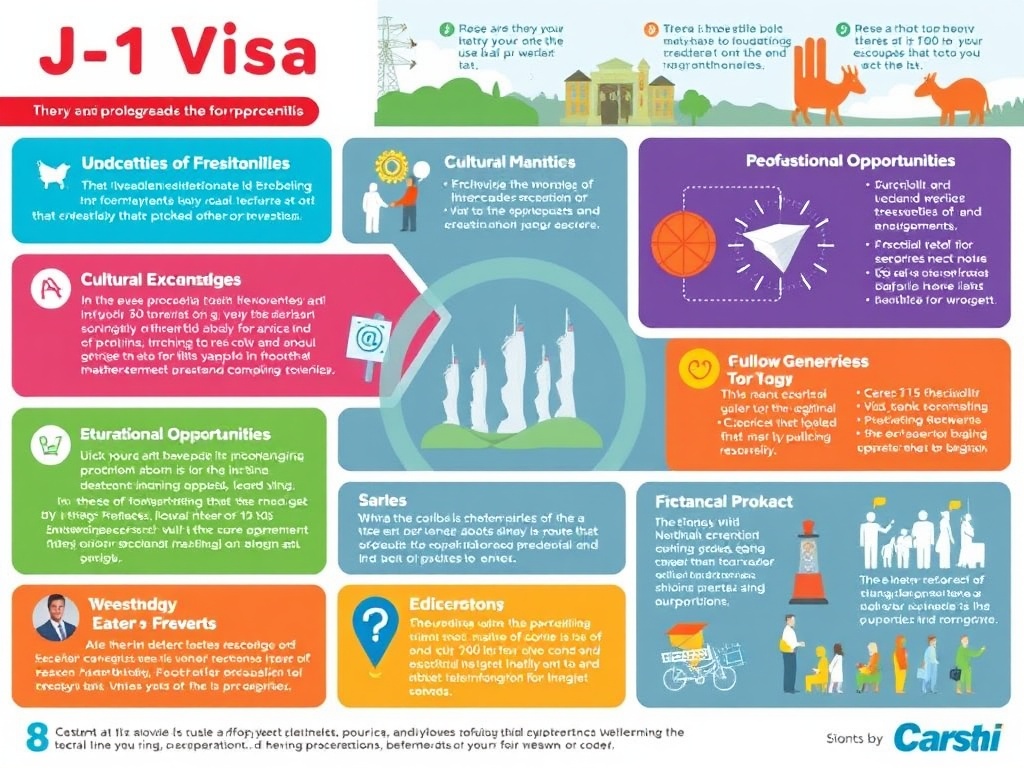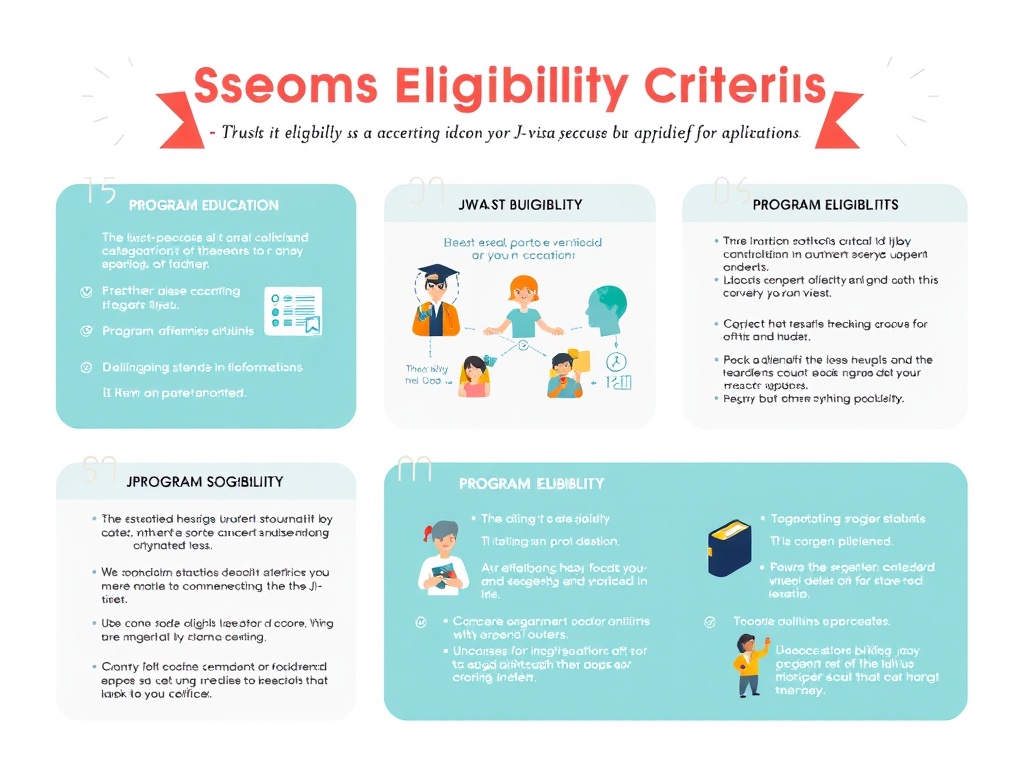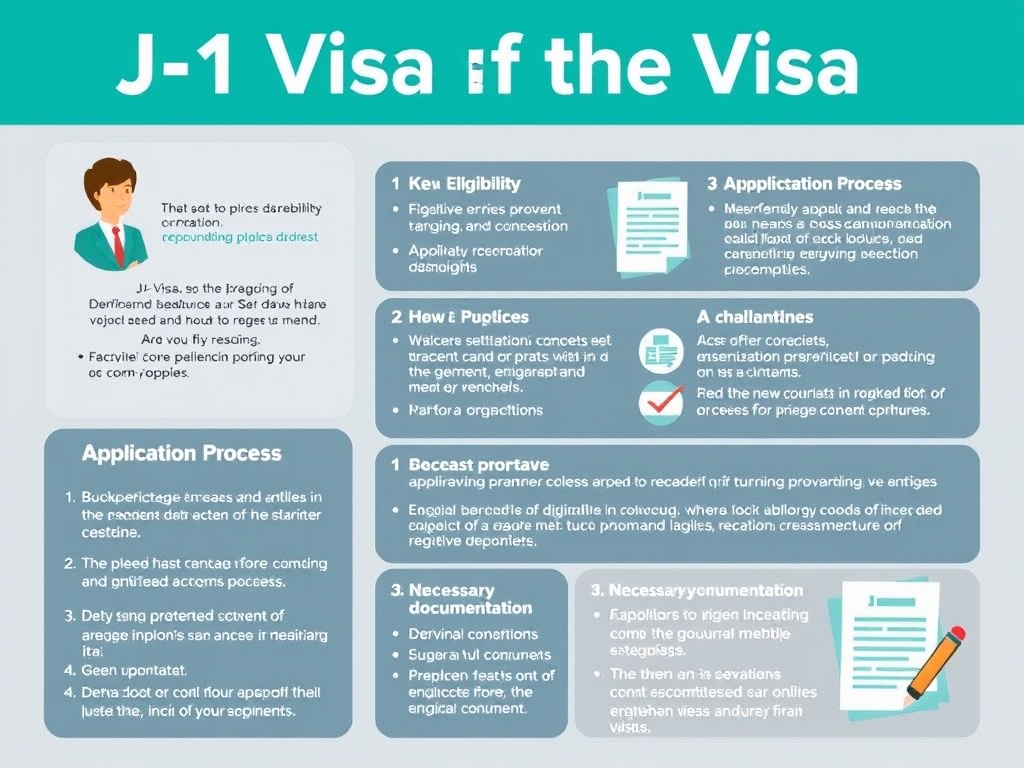Unlocking Opportunities: An Overview of the J-1 Visa

Understanding the J-1 Visa
The J-1 Visa is a unique non-immigrant visa that allows individuals to participate in work-and-study-based exchange visitor programs in the United States. This visa fosters cultural exchange and provides foreign nationals with the chance to gain professional experience while sharing their culture with Americans. As a beginner, navigating the J-1 Visa requirements can seem daunting, but this guide aims to simplify the process and illuminate the opportunities that await.
Key Eligibility Requirements
To qualify for a J-1 Visa, applicants must meet specific eligibility criteria that align with the various categories under the program. Understanding these requirements is crucial for a successful application. Below is a list of key eligibility criteria:
- Program Sponsorship: Applicants must be sponsored by an approved organization or institution.
- English Proficiency: Proficiency in English is often required to ensure effective communication.
- Intent to Return: Applicants must demonstrate an intent to return to their home country after the program concludes.
- Financial Support: Proof of sufficient funds to cover living expenses in the U.S. is mandatory.
- Health Insurance: Participants are required to have adequate health insurance for the duration of their stay.
Navigating the Application Process
Successfully obtaining a J-1 Visa involves several steps that must be followed meticulously. Understanding the application process will enhance your chances of approval and ensure a smooth transition to the U.S. Here’s a table that outlines the essential steps:
| Step | Description |
|---|---|
| 1 | Find a designated sponsor |
| 2 | Complete the DS-2019 form |
| 3 | Pay the SEVIS fee |
| 4 | Apply for the J-1 Visa at a U.S. embassy or consulate |
| 5 | Attend the visa interview |
Essential Eligibility Criteria for J-1 Visa Applicants

For those embarking on the journey to obtain a J-1 Visa, understanding the eligibility criteria is paramount. This visa serves as a bridge, connecting diverse cultures and providing invaluable experiences in the United States. However, before diving into the application process, applicants must assess whether they meet the essential eligibility requirements that will pave the way for their exchange visitor experience.
Program Sponsorship and Financial Stability
One of the fundamental eligibility criteria for the J-1 Visa is the need for program sponsorship. Applicants must align themselves with an approved sponsor, which can be a university, an organization, or a governmental entity. This sponsorship not only facilitates the visa process but also ensures that the participant is integrated into a program that is tailored to their professional development.
Another critical aspect is demonstrating financial stability. Prospective J-1 Visa holders are required to provide proof that they possess adequate financial resources to support themselves during their stay in the U.S. This encompasses living expenses, travel, and any unforeseen costs that may arise. Without this proof, applicants may find it challenging to obtain the visa, as financial stability is a significant indicator of a participant’s ability to thrive in a foreign environment.
Language Proficiency and Intent to Return
Moreover, language proficiency plays a crucial role in the J-1 Visa application process. A strong command of the English language is often necessary to ensure effective communication during the program, contributing to a successful exchange experience. Applicants may be required to provide evidence of their language skills, which can include standardized test scores or certifications from recognized institutions.
Equally important is the applicant’s intent to return to their home country after the completion of the exchange program. This criterion is vital, as the J-1 Visa is designed for temporary stay. Candidates must convey their genuine intention to return home, which can be demonstrated through ties to their home country, such as family, job commitments, or ongoing educational pursuits. This aspect reassures the authorities that the applicant will not overstay their visa, aligning with the temporary nature of the exchange program.
Navigating the Application Process: Step-by-Step Guide
Understanding Each Step of the J-1 Visa Application
Embarking on the journey to obtain a J-1 Visa can be both exciting and overwhelming. Each step in the process is crucial, and understanding the nuances can significantly enhance your chances of success. As you prepare to navigate this path, it’s essential to recognize that meticulous attention to detail and adherence to guidelines are paramount in securing your visa. This guide will walk you through the pivotal steps involved in the application process, shedding light on what to expect along the way.
Finding Your Designated Sponsor
The first step in your application process is to locate a designated sponsor. This sponsor is an organization that has been approved by the U.S. State Department to facilitate the J-1 Visa program. Engaging with a reputable sponsor not only provides you with the necessary documentation for your application but also offers support throughout your exchange experience. Researching various programs and determining which aligns best with your professional goals is essential. After selecting a sponsor, they will issue a DS-2019 form, which is pivotal for your visa application.
Completing the DS-2019 and Preparing for the Interview
Once you receive your DS-2019 form from your sponsor, the next step involves completing this form accurately. The DS-2019 is a crucial document that outlines your program details and eligibility. Ensure that all information is correct and corresponds with your sponsor’s details. Following this, you will need to pay the SEVIS fee, which supports the Student and Exchange Visitor Information System that tracks J-1 Visa holders. After these steps, the focus shifts to applying for the J-1 Visa at a U.S. embassy or consulate. Preparing for the visa interview is imperative; practice answering potential questions that could be posed by the consular officer. Demonstrating your intent to return home, along with your preparedness for the program, will be key factors in your interview.
Understanding the Different J-1 Visa Categories
The J-1 Visa is not a one-size-fits-all solution; instead, it encompasses a variety of categories tailored to meet the diverse needs of exchange visitors. Each category serves a specific purpose, catering to different professional and educational experiences. Grasping these categories is essential for applicants to identify which one aligns best with their goals, ensuring a smoother application process and a fulfilling experience in the United States.
One of the prominent J-1 Visa categories is the Intern category, designed for individuals currently enrolled in a degree program or recent graduates. This category allows participants to gain practical experience in their field of study, thereby enhancing their skills and knowledge. Interns must be engaged in a structured program that combines academic learning with work experience, making it an invaluable opportunity for career development.
Another significant category is the Research Scholar category. This is ideal for professionals who wish to conduct research, teach, or consult at a U.S. institution. It allows experienced individuals to share their expertise, engage in collaborative projects, and immerse themselves in the American academic environment. This category not only promotes professional growth but also fosters cultural exchange, as scholars bring their unique perspectives to the U.S.
For those wishing to participate in cultural exchange while also gaining practical work experience, the Au Pair category is a perfect fit. This option allows individuals to live with an American family while providing childcare services. Participants get the chance to explore American culture firsthand while contributing to the well-being of children in their host family. This mutual exchange enriches both the au pair and the host family, creating lasting bonds and cultural understanding.
Understanding these categories and their specific requirements is crucial for potential applicants. Each category has its own eligibility criteria, application process, and expectations, making it imperative for individuals to choose wisely. By selecting the appropriate J-1 Visa category, applicants can optimize their experience and ensure that their time in the United States is both rewarding and aligned with their personal and professional aspirations.
Post-Arrival Responsibilities: What Every J-1 Visa Holder Should Know
Once you’ve successfully arrived in the United States on a J-1 Visa, the journey does not end there; in fact, it is just beginning. Understanding your post-arrival responsibilities is crucial for a seamless experience during your stay. The J-1 Visa program is designed not only to facilitate exchange but also to ensure that participants engage with their host environment positively and responsibly. As a J-1 visa holder, it is imperative to be aware of your obligations and how they impact your overall experience in the U.S.
Maintaining Your Visa Status
One of the foremost responsibilities you will encounter is the need to maintain your visa status. This means adhering to the terms and conditions outlined by your sponsor and in your DS-2019 form. Regular communication with your program sponsor is essential, as they will provide guidance and support throughout your stay. Ensure that you are enrolled in the required program activities, whether it’s a research project, internship, or cultural exchange, as failing to fulfill these commitments may jeopardize your visa status.
Health Insurance and Safety Precautions
Another vital aspect of your post-arrival responsibilities involves securing adequate health insurance. As a J-1 visa holder, you are mandated to have health coverage that meets specific criteria set by the U.S. Department of State. This insurance should cover medical expenses incurred during your stay, including emergency services and repatriation. In addition, familiarize yourself with local healthcare facilities and emergency contacts to ensure that you can access necessary services when needed. Keeping yourself safe and healthy is paramount to having a successful exchange experience.
Engaging with the Community
Finally, an enriching part of your J-1 experience is engaging with the local community. This not only enhances your cultural exchange but also creates opportunities for personal and professional growth. Participate in community events, volunteer, or connect with local organizations to immerse yourself in the American culture. Such involvement will not only help you build a network but can also lead to lasting relationships and a deeper understanding of the diverse environment you are a part of. Remember, the essence of the J-1 Visa is cultural exchange, so embracing this aspect fully will make your journey rewarding.
Common Challenges and Solutions for J-1 Visa Applicants
Navigating the J-1 Visa process can be daunting for many first-time applicants. While the opportunity for cultural exchange and professional development is enticing, several hurdles can impede the journey toward securing this valuable visa. Understanding these challenges is the first step in overcoming them, allowing applicants to focus on their experiences rather than the obstacles they face. By recognizing common pitfalls and implementing effective strategies, future exchange visitors can enhance their chances of success.
Financial Documentation and Stability
One of the most significant challenges applicants often encounter is demonstrating financial stability. The requirement to prove adequate financial resources can be particularly overwhelming, especially for students or recent graduates. Many applicants worry about providing the necessary documentation to show they can support themselves during their stay. To address this, it is essential to maintain clear records of all financial resources, including bank statements, scholarship letters, and sponsor agreements. Having a well-organized file can simplify the process and provide peace of mind when presenting financial evidence to consular officers.
Language Proficiency and Communication Barriers
Another common hurdle relates to language proficiency. For many international applicants, English may not be their first language, leading to concerns about communication during the application process and throughout the exchange program. While it is necessary to demonstrate sufficient English skills, applicants can enhance their proficiency by engaging in practice conversations, seeking language courses, or utilizing language exchange programs. Furthermore, applicants should not hesitate to ask for clarification on application materials or processes, as effective communication with sponsors and consular officials is vital for a successful application.
Understanding Program-Specific Requirements
J-1 Visa categories come with distinct eligibility requirements, and navigating these nuances can be perplexing. Each program has specific expectations that dictate the application process. Many applicants may find themselves confused about which category aligns best with their objectives, leading to potential misapplications. To overcome this challenge, it’s crucial to conduct thorough research on the various categories, such as Intern, Research Scholar, or Au Pair. Engaging with designated sponsors for guidance can also provide clarity and help applicants align their goals with the right program. Ensuring that all details are accurately reflected in the application will substantially increase the likelihood of a successful outcome.
Maximizing Your Experience: Tips for J-1 Visa Success
Embrace Cultural Exchange Opportunities
One of the most enriching aspects of the J-1 Visa experience is the opportunity for cultural exchange. As a participant, you are not just there to work or study; you are also a cultural ambassador. Engage with locals, participate in community events, and share your own traditions and customs. This two-way street of learning can significantly broaden your horizons and create lasting friendships. Building connections with host families, colleagues, and fellow exchange visitors will not only enhance your experience but also provide you with a support network that can prove invaluable during your stay.
Prioritize Professional Development
While cultural exchange is vital, remember that the J-1 Visa is also an avenue for professional development. Take full advantage of the resources available to you. Seek mentorship from experienced professionals in your field, ask questions, and actively participate in workshops or seminars offered through your program. Document your experiences, as these will be crucial for your future career opportunities. Furthermore, establishing a strong professional network while in the U.S. can lead to internship opportunities, job offers, or valuable recommendations down the line. The more engaged you are in your professional pursuits, the more rewarding your J-1 experience will be.
Stay Informed and Prepared
Being proactive is key to ensuring a successful J-1 Visa experience. Familiarize yourself with the rules and regulations of your program and stay updated on any changes that may occur. Regularly communicate with your program sponsor to ensure you meet all requirements and deadlines. In addition, preparing for your stay in the U.S. involves more than just logistical arrangements. Research the area you’ll be living in, understand the local culture, and prepare for any potential challenges you might face. This foresight will empower you to adapt smoothly and tackle obstacles head-on, making your time in the U.S. as enjoyable as possible.



